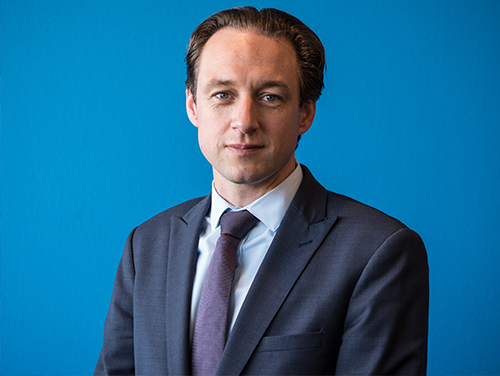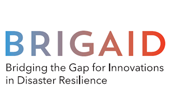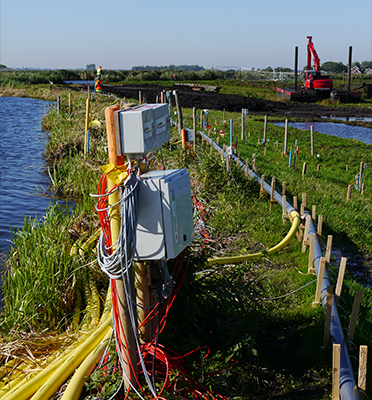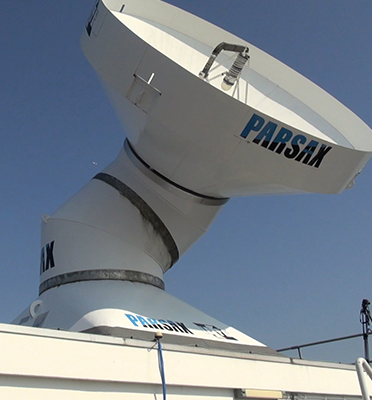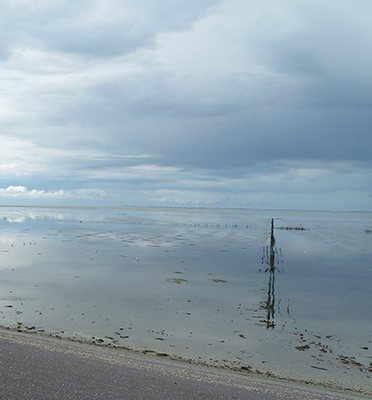Climate scientists are predicting an increase in droughts, floods and other extreme weather events as a result of continuing global warming. BRIGAID (Bridging the gap for Innovations in Disaster Resilience), an ambitious programme initiated by a partnership of European universities, research institutes and businesses in May of this year, is aimed at finding innovative ways of coping with the increased likelihood of natural disasters of this kind. Bas Jonkman (39), Professor of Integral Hydraulic Engineering at TU Delft’s faculty of Civil Engineering and Geosciences will be heading this multifaceted programme for the next four years.
BRIGAID is an international effort: some 24 organisations from twelve countries – among which seven universities and various small businesses - have joined forces to make the project a success. Funding of 7.8 million euros has been made available through Horizon 2020, the EU framework programme for research and innovation.
‘There is a great deal of international input in BRIGAID,’ Jonkman says. ‘Apart from our own TU Delft scientists we have researchers from the universities of Bologna and Leuven. Some of the project partners are from countries affiliated with the European Union, such as Israel and Albania. The research programme is extremely diverse and covers a lot of ground. We have anthropologists from Oxford, contractors from Romania and just about everything in between. All are bringing their particular knowledge and experience to the project.’
Inventions and innovations
At the heart of BRIGAID are numerous innovations designed to limit the risks and consequences of droughts, floods and other extreme weather events. Finding better techniques to combat forest fires is just one of about a hundred innovations which will be tried and tested in the coming years. Some thirty of the most promising will ultimately find their way onto the market. Jonkman: ‘The big challenge we’re facing is the practical applicability of all these good, innovative ideas that are waiting to be developed into effective products.’
'The big challenge we’re facing is the practical applicability of all these good, innovative ideas'
That is why part of the research project is dedicated to developing a standard test method for all the inventions so they can be made ready to go to market, Jonkman says. ‘This also involves looking at the ethics of the product. We take social acceptance into account as well as commercial viability. And we are working on creating a network of shareholders, end users and developers.’
Applied research
The BRIGAID project is primarily focused on applied research, reiterates Jonkman. ‘We’re not solely aiming for PhDs or the publication of scientific articles. The objective is to show, test and develop the practical effectiveness of new techniques. Some of the ideas that will be put to the test in the coming years have been suggested by commercial partners and we have a budget at our disposal to develop ideas that have a clear potential.’
'The objective is to show, test and develop the practical effectiveness of new techniques.'
BRIGAID’s official kick-off was in May of this year, at a big meeting in Delft of all the partners involved in the project. The shape and structure of the research will become clear in the twelve months ahead. Jonkman, who heads and coordinates the project, is busy putting together his own team in Delft. ‘I have assembled a core team but I’m still looking for scientific staff. We need a postdoc student to look at the ecological impact of the innovations, for instance, and another researcher to look at technical effectiveness.’
Of the faculty of Civil Engineering and Geosciences the departments of Hydraulic Engineering and Water Management are taking part in BRIGAID. Other faculties include Technology, Policy & Management, and the Innovation & Impact Centre.
Flood Proof Holland
Delft will also be a testing ground for a number of inventions aimed at limiting damage caused by drought, floods and other extreme weather events. At the test and demonstration polder Flood Proof Holland, next to the A13 highway, innovations in the area of temporary flood barriers (like sandbags) will be put through their paces.
‘A Dutch company has come up with an idea for installing temporary barriers in the case of high tide. These would increase the height of existing dikes or strengthen them temporarily and so prevent flooding,’ says Jonkman. ‘The company is looking for people to provide them with the necessary technical knowledge. They want to know how it will work and how reliable it is. These people know their way in the commercial world but they are not really familiar with the academic world of water management. Within BRIGAID we try to promote partnerships between companies like these, universities and government institutions.’
A similar testing ground is being created in Romania. Jonkman: ‘Frequent flooding is a problem in Romania and this new facility is aimed at finding innovative ways of preventing this from happening. Romania has many small rivers and in many cases the surrounding land is not protected by dikes.’
Other countries are following suit and creating sites for testing the techniques to withstand the ravages of droughts or other extreme weather events. ‘We want to test in the field because it provides us with data relevant to the location,’ says Jonkman. ‘So in Israel we want a site to test innovations to do with drought while in Venice we want a site to test solutions that will help cope with flooding caused by rising sea levels and a sinking ocean floor.’
Feasability and commercial success
BRIGAID is multifaceted and international and that is what makes it so unique. Jonkman: ‘It’s a package full of great gifts for us to unwrap. But we may not like them all equally. We have to make a selection. All that glitters isn’t always gold.’
The project is a good example of a larger trend that sees scientists and universities partner up with commercial businesses. We want to demonstrate that we can use the academic expertise to contribute to societal and commercial achievements. Every idea is vetted for feasibility and commercial success. Once BRIGAID comes to an end, the method we’re developing to do this will hopefully become the new standard by which we judge the ideas of the future.’
Published: August 2016

